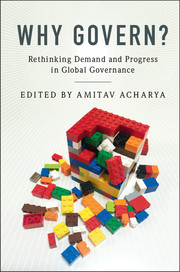Book contents
- Frontmatter
- Contents
- List of Figures
- List of Tables
- Notes on Contributors
- Acknowledgments
- List of Abbreviations
- 1 Rethinking Demand, Purpose and Progress in Global Governance: An Introduction
- Part I The Changing Concept of Global Governance
- Part II Issue Areas
- 5 Conflicts and Security
- 6 Human Rights
- 7 Atrocity Crimes
- 8 Trade
- 9 Finance
- 10 Climate
- 11 Refugees
- 12 Health
- 13 Cyberspace and Social Media
- 14 The Contested Quest for Global Governance: Conclusions and Directions for Further Research
- Bibliography
- Index
14 - The Contested Quest for Global Governance: Conclusions and Directions for Further Research
from Part II - Issue Areas
Published online by Cambridge University Press: 05 September 2016
- Frontmatter
- Contents
- List of Figures
- List of Tables
- Notes on Contributors
- Acknowledgments
- List of Abbreviations
- 1 Rethinking Demand, Purpose and Progress in Global Governance: An Introduction
- Part I The Changing Concept of Global Governance
- Part II Issue Areas
- 5 Conflicts and Security
- 6 Human Rights
- 7 Atrocity Crimes
- 8 Trade
- 9 Finance
- 10 Climate
- 11 Refugees
- 12 Health
- 13 Cyberspace and Social Media
- 14 The Contested Quest for Global Governance: Conclusions and Directions for Further Research
- Bibliography
- Index
Summary
This volume has focused on the demand for global governance – especially what causes it and how and why demand – understood as having both utilitarian and social purposes – vary across time and issue areas. Using demand as the central analytic framework, we looked at the architecture, actors and progress of global governance, the latter in terms of the legitimacy, efficacy and durability of its institutions and forms.
Part I of the volume dealt with some of the broad questions of structure and agency in global governance from a historical and conceptual standpoint. Deudney's sweeping historical overview (Chapter 2) traces how the structure of global governance has shifted from vertical or hierarchical to more horizontal and local forms. In essence, he outlines the long-term devolution (“descent”) of global governance from empires to individuals, and from globalism to localisms. Kahler (Chapter 3) examines the evolution and modification of liberal norms as the basis of the postwar global governance architecture, and questions the tendency to view them exclusively in terms of the power and purpose of the United States. He then examines the challenge posed by the rising powers to the liberal international order and how that order might be sustained through a process of redefinition and broadening to accommodate the rising powers. Hall (Chapter 4) questions the rationalist, functionalist and economistic determinants of the demand for global governance in favor of normative and social factors. Together, these chapters expand the conceptual framework for analyzing the evolution, current architecture and future direction of global governance.
Part II of the volume covers nine case studies: security governance (Mack, Chapter 5), human rights (Sikkink, Chapter 6), atrocities (Thakur, Chapter 7), trade (Sell, Chapter 8), finance (Helleiner, Chapter 9), climate (Jinnah, Chapter 10), refugees (Betts, Chapter 11), health (Fidler, Chapter 12), and cyberspace and social media (Cogburn, Chapter 13). The following sections summarize the main findings of these case studies (see Table 14.1).
Directions in Demand
The demand for global governance is not simply rising in a linear fashion across all issue areas. This volume shows that demand may be strengthening in climate change, human rights, global security governance and atrocities, but weakening in health and trade, and remains static or uncertain in other areas such as finance, refugees, and health. In trade, finance, refugees, and health, there is clear evidence that the demand for global governance is crisis-driven.
- Type
- Chapter
- Information
- Why Govern?Rethinking Demand and Progress in Global Governance, pp. 272 - 296Publisher: Cambridge University PressPrint publication year: 2016



